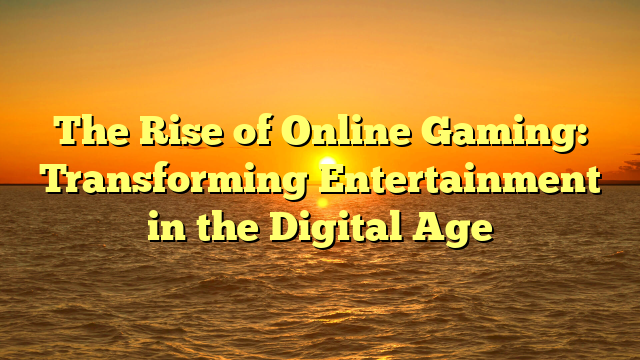
Introduction
Online gaming has rapidly evolved from a niche hobby to a global phenomenon, captivating millions of players worldwide. With advancements in technology, the gaming industry has expanded its horizons, offering immersive experiences that transcend Slot777 geographical boundaries. This article delves into the evolution of online gaming, its current landscape, and the profound impact it has on entertainment, social interactions, and even the economy.
The Evolution of Online Gaming
- Early Beginnings
Online gaming traces its roots back to the late 1970s and early 1980s with the advent of multiplayer games on mainframe computers and early network systems. Titles like MUD (Multi-User Dungeon) laid the foundation for text-based online interactions, allowing players to collaborate and compete in virtual environments. - The Rise of MMORPGs
The late 1990s and early 2000s witnessed the emergence of Massively Multiplayer Online Role-Playing Games (MMORPGs) such as World of Warcraft and EverQuest. These games offered expansive worlds where thousands of players could interact simultaneously, fostering strong communities and long-term engagement. - Console and Mobile Integration
As internet connectivity improved and consoles like the PlayStation and Xbox incorporated online capabilities, online gaming became more accessible. The proliferation of smartphones further revolutionized the industry, introducing a new segment of casual gamers through mobile titles like Clash of Clans and PUBG Mobile. - Cloud Gaming and Streaming
The latest advancements include cloud gaming services like Google Stadia, NVIDIA GeForce Now, and Microsoft’s Xbox Cloud Gaming. These platforms allow players to stream high-quality games without the need for powerful hardware, democratizing access to premium gaming experiences. Additionally, game streaming platforms such as Twitch and YouTube Gaming have turned gaming into a spectator sport, where influencers and streamers engage vast audiences.
Current Landscape of Online Gaming
- Diverse Game Genres
Online gaming today encompasses a wide array of genres, including first-person shooters (FPS), battle royales, real-time strategy (RTS), simulation games, and more. Each genre caters to different player preferences, ensuring that there is something for everyone. - Esports Explosion
Esports has transformed competitive gaming into a legitimate sport, complete with professional leagues, sponsorships, and substantial prize pools. Games like League of Legends, Dota 2, and Fortnite host international tournaments that attract millions of viewers, rivaling traditional sports in popularity. - Social and Community Features
Modern online games prioritize social interactions, incorporating features such as voice chat, guilds, and in-game events. These elements foster a sense of community and collaboration, making gaming a social activity rather than a solitary pastime. - Cross-Platform Play
The ability to play across different platforms—PC, consoles, and mobile devices—has become a standard expectation. Cross-platform compatibility enhances the gaming experience by allowing friends to play together regardless of their chosen device.
Impact of Online Gaming
- Economic Growth
The online gaming industry is a significant contributor to the global economy, generating over $150 billion in revenue annually. This growth is fueled by game sales, in-game purchases, subscriptions, and advertising. Additionally, the rise of indie developers has diversified the market, bringing innovative games to the forefront. - Technological Advancements
Online gaming drives technological innovation, particularly in areas like graphics rendering, artificial intelligence, and network infrastructure. The demand for seamless, high-performance gaming experiences pushes the boundaries of what technology can achieve, benefiting other industries in the process. - Educational and Therapeutic Uses
Beyond entertainment, online games are being utilized for educational purposes and therapeutic interventions. Educational games can enhance learning through interactive and engaging methods, while certain games have been developed to assist in mental health treatment by providing stress relief and cognitive training. - Cultural Influence
Gaming has become a significant cultural force, influencing music, art, and storytelling. Iconic games often inspire movies, TV shows, and merchandise, creating a symbiotic relationship between gaming and other entertainment mediums. Additionally, gaming communities contribute to cultural exchange and global connectivity.
Challenges and Considerations
- Addiction and Mental Health
The immersive nature of online games can lead to excessive gaming, raising concerns about addiction and its impact on mental health. Balancing screen time and promoting healthy gaming habits are essential to mitigate these risks. - Cybersecurity and Privacy
Online gaming platforms are susceptible to cybersecurity threats, including hacking, phishing, and data breaches. Ensuring robust security measures and protecting player data is paramount to maintaining trust and safety within the gaming community. - Toxicity and Harassment
Online interactions can sometimes become hostile, with instances of toxicity and harassment affecting the player experience. Game developers and platforms are implementing measures such as reporting systems, moderation, and community guidelines to address these issues. - Digital Divide
Despite advancements, access to high-speed internet and modern gaming devices remains uneven across different regions and socio-economic groups. Bridging this digital divide is crucial to making online gaming an inclusive and equitable form of entertainment.
The Future of Online Gaming
- Virtual Reality (VR) and Augmented Reality (AR)
VR and AR technologies promise to take online gaming to new heights by offering even more immersive and interactive experiences. Games like Half-Life: Alyx and Pokémon GO demonstrate the potential of these technologies to revolutionize how players engage with virtual worlds. - Artificial Intelligence and Machine Learning
AI and machine learning will continue to enhance game design, from creating more intelligent and adaptive NPCs (Non-Player Characters) to personalizing gameplay experiences based on individual player behavior and preferences. - Blockchain and NFTs
The integration of blockchain technology and Non-Fungible Tokens (NFTs) into online gaming introduces new possibilities for digital ownership, in-game economies, and player-driven content creation. While still in its infancy, this trend could reshape the landscape of virtual assets and monetization models. - Sustainability and Ethical Gaming
As the gaming industry grows, there is increasing emphasis on sustainability and ethical practices. This includes reducing the environmental impact of data centers, promoting diversity and inclusion within gaming communities, and ensuring fair labor practices in game development.
Conclusion
Online gaming has undeniably transformed the entertainment landscape, offering endless possibilities for innovation, social interaction, and economic growth. While challenges such as addiction, cybersecurity, and toxicity persist, the industry’s commitment to addressing these issues paves the way for a more inclusive and responsible gaming future. As technology continues to advance, online gaming will likely become even more integrated into our daily lives, shaping how we play, connect, and experience virtual worlds.




